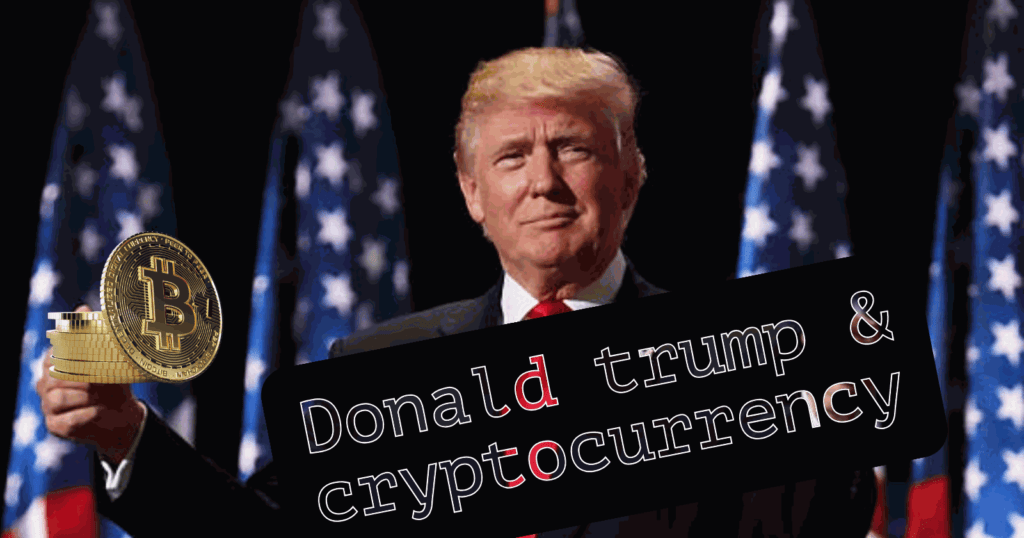
In a groundbreaking move that has reverberated across both political and financial spheres, former President Donald Trump has announced that his 2024 presidential campaign will accept cryptocurrency donations. This decision signifies a monumental shift in political campaign financing, injecting the disruptive potential of digital currencies into the heart of electoral politics. The implications of this development are vast, and it has ignited a fervent debate about the role of cryptocurrency in the political arena.
Cryptocurrency: A Growing Trend in Political Finance
Trump’s decision to embrace cryptocurrency isn’t an isolated phenomenon but part of a broader trend where digital currencies are gaining traction. Over the past decade, cryptocurrencies like Bitcoin, Ethereum, and others have transitioned from niche assets to mainstream financial instruments. Major corporations, from Tesla to PayPal, have integrated cryptocurrencies into their operations, signaling widespread acceptance.
The political domain is not immune to this evolution. A growing number of political campaigns and organizations are recognizing the advantages of accepting donations in digital currencies. This movement towards crypto donations aligns with the broader adoption of blockchain technology across various sectors, highlighting the adaptability and resilience of cryptocurrencies in diverse applications.
The Advantages of Cryptocurrency Donations in Politics
Cryptocurrency offers several compelling benefits for political fundraising, which could revolutionize how campaigns are funded:
- Enhanced Security and Transparency:
- Cryptocurrencies operate on blockchain technology, a decentralized ledger that records all transactions transparently and immutably. This public ledger ensures that every contribution is securely documented and verifiable, reducing the risk of fraud and misuse of funds. Each transaction is traceable, offering unprecedented transparency in political donations.
- Global Accessibility:
- Unlike traditional fiat currencies, which are often restricted by national boundaries and banking regulations, cryptocurrencies can be transferred globally without significant barriers. This feature makes them particularly attractive for international supporters who wish to contribute to a campaign without the hassle of currency conversion or international banking fees.
- Reduced Transaction Costs and Speed:
- Cryptocurrency transactions typically involve lower fees compared to traditional banking methods, particularly for large transfers. Additionally, these transactions are processed almost instantaneously, providing campaigns with rapid access to funds.
- Anonymity and Privacy:
- While all transactions on a blockchain are public, the identities of the parties involved can remain private. This allows for anonymous donations, which can appeal to donors concerned about privacy.
The Winklevoss Twins’ Endorsement: A Crypto Power Play
A pivotal endorsement of Trump’s move to accept cryptocurrency donations comes from the Winklevoss twins, Cameron and Tyler, renowned figures in the cryptocurrency world. The twins, who have been at the forefront of advocating for digital currency adoption through their exchange, Gemini, have pledged $1 million in Bitcoin to Trump’s campaign. Their endorsement underscores Trump’s alignment with the pro-crypto community and his recognition of the transformative potential of blockchain technology.
The Winklevoss twins’ support is not merely financial but symbolic, reflecting the broader endorsement of cryptocurrency’s role in political finance by influential crypto advocates. This backing signals a new era where digital assets could play a central role in shaping political landscapes.
The Implications of Cryptocurrency in Political Campaigns
Trump’s acceptance of cryptocurrency donations marks a pivotal moment in political fundraising, with the potential to reshape the financial strategies of future campaigns. The integration of digital currencies into campaign finance could lead to several transformative changes:
- Increased Donor Engagement: Cryptocurrency donations can attract a tech-savvy and financially engaged demographic that might otherwise be underrepresented in traditional fundraising methods.
- New Regulatory Challenges: As political campaigns adopt cryptocurrencies, they will navigate complex regulatory landscapes. Governments and electoral bodies will need to establish guidelines to address issues like donor anonymity, contribution limits, and financial disclosure.
- Innovation in Fundraising Strategies: The flexibility of cryptocurrencies could foster innovative fundraising approaches, such as micro-donations from a global base, peer-to-peer fundraising initiatives, and integration with decentralized finance (DeFi) platforms.
- Potential for Increased Scrutiny: With the benefits of cryptocurrency also come concerns about potential misuse, such as the risk of foreign interference or the difficulty in tracking donations from illicit sources. Campaigns will need robust mechanisms to address these challenges.
A New Era in Political Finance
As more political campaigns explore the possibilities of cryptocurrency, the landscape of political finance is poised for significant change. This new era could usher in more transparent, efficient, and globally inclusive fundraising practices. However, it will also require careful navigation of regulatory, ethical, and operational challenges.
The acceptance of cryptocurrency donations by Donald Trump’s 2024 campaign signals not just a trend but potentially a paradigm shift in how political campaigns are funded and operated. As we stand on the cusp of this financial transformation, one thing is clear: the future of political finance is being written on the blockchain.
Read More
Latest post

